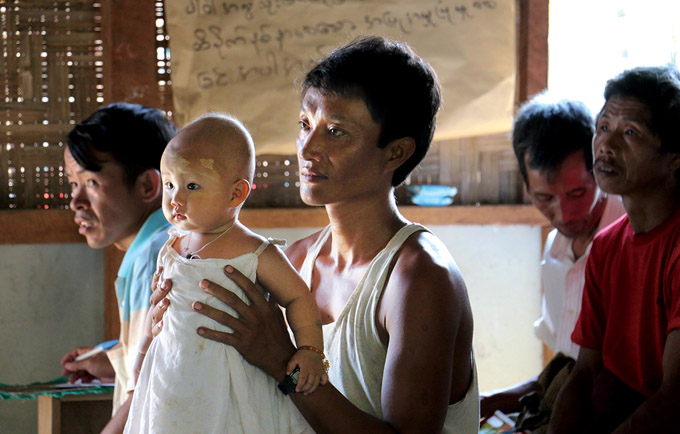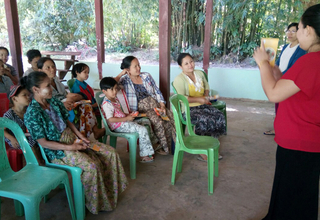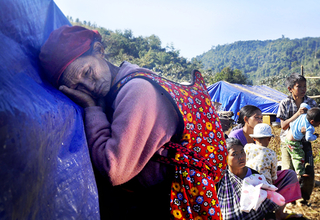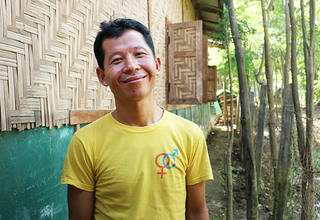On a Wednesday afternoon in the monsoon month of September, the community hall at the Myo Ma camp for internally displaced persons (IDPs) in Waing Maw Township, Kachin, Myanmar, is full of people. Husbands, fathers and brothers have come to learn about domestic violence and other forms of gender-based violence (GBV).
The awareness-raising sessions for boys and men in IDP camps is a key component of UNFPA’s GBV programme in Myanmar. Violence against women, particularly domestic violence, is widespread in the country, and to engage men and boys is an important part of the battle against gender-based violence. The learning sessions are run as a collaboration between male volunteers in the camps, and female staff from UNFPA-supported Women and Girls Centres.
All the male volunteers live in the camps and are themselves IDPs. Together with their families they fled from armed fighting in and around their villages in 2011. They have been living in protracted displacement in camps ever since, unable to return. Although the country is in democratic transition with Nobel Peace Prize laureate Aung San Suu Kyi at the helm of the government, and although a peace process is underway, the fighting in Kachin rages on.
“To be honest, I feel lost”
Today, the GBV session is facilitated by volunteer Zau San Naw. He was 15 years old when the conflict suddenly reached his home near Laiza. With bullets flying through the village, he and his family ran in different directions, into the night. After finally reuniting, they made it to the Mya Ma camp where they have been trying to rebuild their lives ever since. Zau Saw Naw, arrived as a teenager. He is now a solemn and sincere young man of 21. When he smiles, his eyes remain grave. His future is already here, but it’s not the future he once thought would be his.
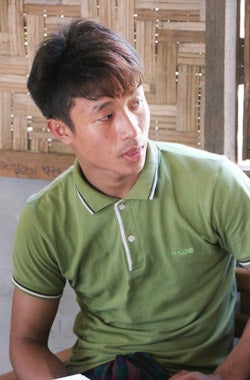
“To be honest, I feel lost. My ambitions are blurred. My education was interrupted and I’m now several years behind. My skills are in animal husbandry and tending the fields but there is no such work for me here.”
He and the other men in the camps have lost their livelihoods, and job opportunities are few and often grim. Some find work as day labourers cutting sugar cane or collecting firewood. Some make the long journey to the infamous jade mines in Hpakant, often to succumb to mining accidents, drug abuse and HIV infection. Some languish in unemployment. All struggle to provide for their families, and to hold onto their dignity.
“Men need help too”
“I would like to go back to my village and live as a farmer. But I’ve been living in the camps for so long that I’ve lost hope. My assignment as a GBV volunteer helps me to carry on.”
“As a volunteer, I have learned how to intervene when a husband is violent to his wife and family, and I am often able to prevent further violence. In this way, I help women. But men need help too. We men are in a difficult situation in the camp, and it’s not easy for us to talk about it. The GBV programme allows us to get together as men and discuss our situation and problems freely. In this way, I help men.”
Supporting IDPs to help other IDPs is an important peer-to-peer mechanism for empowering both women and men living in protracted displacement. Their entitlements help them financially, and they are able to shape a response to gender-based violence that works in their own communities.
“Many people, both men and women, think that domestic violence is a private matter, but it’s not. As a volunteer, I can change their attitudes by sharing what I know to be right and wrong. And together with female volunteers, camp management, and staff from the Women and Girls Centre, I work with families to find both immediate and long-term solutions. When I despair for my own life and future, I hold on to the pride that I feel as a GBV volunteer and for helping my community.”
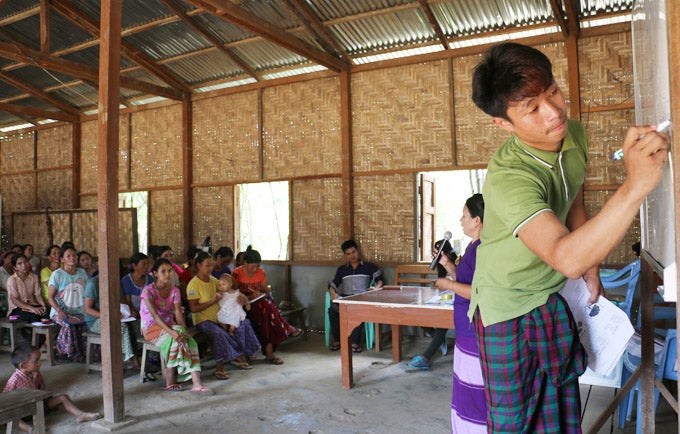
UNFPA’s gender-based violence programme in Kachin includes eight Women and Girls centres and both male and female volunteers. Together they cover 38 camps for internally displaced people and their host communities in both government controlled areas and non-government controlled areas. The programme is supported under the Women and Girls First initiative, which is funded by Australia, Canada, Finland, Italy, Sweden and the UK.
